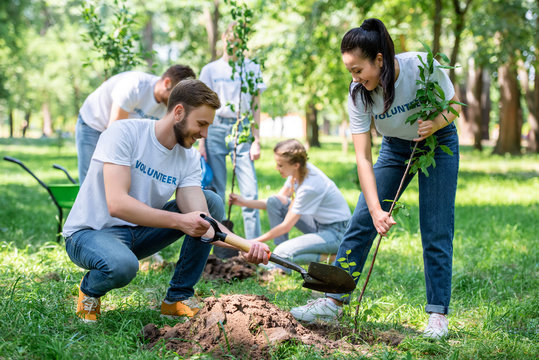6 Ways to Get Involved in Your Community’s Sustainability Efforts
By Beth Rush
As a green living enthusiast, you may have asked, “How can you contribute to the sustainability of your community?” Naturally, you want to make a lasting impact on the planet, but you know you need help.
Getting involved in local sustainability efforts is one of the best ways to act as an environmental steward. From volunteering to community projects and educating others about critical ecological topics, countless opportunities exist to create a positive change where you live.
Volunteering Is Good for the Soul
Volunteering in the community has a wealth of personal and societal benefits, connecting you with people who share your values and passion for making a difference. Some studies even indicate lower mortality rates by displaying altruistic behavior.
Volunteers have a chance to develop new skills they can apply to other areas of their lives. For instance, you learn communication skills, become more adaptable, deepen your sense of compassion and become a better leader.
Yet, the mental health benefits of becoming involved in environmental stewardship are most profound. In one study, 58% of participants demonstrated improved cognitive health, while 8% saw a decline in attention-deficit/hyperactivity disorder symptoms.
Another study highlighted how spending time in nature helped ease depression, significantly complementing standard behavioral health treatments. This predicts a favorable outcome for your overall well-being by improving the natural world, interacting with the community and giving back.
How Can You Contribute to the Sustainability of Your Community?
Adopting a sustainable lifestyle is easy when you make simple changes with tremendous effects on the environment. However, the greatest impact occurs through community-wide efforts. Here’s how to get everyone involved in your town’s sustainability.
Start a Community Garden
Community gardens prompt a higher intake of fruits and vegetables, positively impacting people’s health. It also provides social advantages for gardeners to gather and care for community plots.
Additionally, community gardens create additional green spaces, promoting organic urban food production and sustainable practices like water conservation and soil health. Perhaps most importantly, community gardens can reduce food waste and increase accessibility to nutrition in food deserts.
Organize a Park Cleanup
Keep your community’s green spaces pristine by organizing a park cleanup. Volunteers can join you in picking up trash and recycling correctly, helping make your local parks cleaner and safer for people and wildlife.
Choose a date, time and location for your cleanup event and obtain the necessary permits from the town. Then, contact family, friends, neighbors, schools and businesses to see who wants to participate. Some small businesses may even donate gloves, trash bags and other essential supplies.
Before everyone sets out, hold a brief meeting to discuss rules and safety protocols. For instance, volunteers should call local authorities if they stumble upon narcotics or other dangerous objects.
Host a Movie Night
About one in 15 North Carolinians discovered they were drinking contaminated water after The Chemours Company — and parent company DuPont De Nemours — knowingly dumped per- and polyfluoroalkyl substances (PFAS) in the Cape Fear River for 30 years.
When Mark Ruffalo starred in Dark Waters — a movie about the historic 2001 DuPont water contamination case — the city and several local environmental groups held a movie viewing and panel discussion for concerned residents regarding the state of regional water.
You can host a similar event in your community. What environmental issue is of the greatest concern near you, or is there an issue you’re passionate about in general? Play a documentary related to the topic and discuss it with viewers afterward.
Encourage Composting
Contributing to the sustainability of your community is as straightforward as starting a compost bin. Composting diverts food scraps and biodegradable material from landfills to create nutrient-rich soil.
According to the Environmental Protection Agency, composting is crucial for reducing landfill methane emissions and replenishing soil in parks, gardens, yards and local farms. The compost can even aid in revegetation and prevent stormwater runoff.
Assemble a Focus Group
A sustainability focus group is an excellent way to collaborate with community members and help solve local environmental issues. Idea sharing and project collaboration effectively produce positive changes and provide fun ways for everyone to get involved.
Reviewing your town’s sustainability goals and existing initiatives is a great starting point. Then, define your focus group’s goals and mission. Welcoming diverse viewpoints prompts well-rounded exchanges to help raise awareness of critical environmental problems.
A focus group may also be involved in advocacy and encouraging stewardship among the rest of the community.
Plant Trees
Trees benefit the environment by absorbing carbon emissions and other harmful greenhouse gases. In fact, tree canopies sequester 1.1 million metric tons of air pollution annually across 11 National Capital Area parks in Washington, D.C. They also regulate temperatures, provide habitat for local wildlife, and prevent erosion from stormwater runoff.
Of course, the community also benefits from more trees, such as less noise pollution, higher property values, and shading.
Community members can boost sustainability efforts by partnering with local businesses, nonprofits, and individuals to organize and host tree-planting events. You can also involve your neighbors in planting more trees on their properties.
Small Efforts Create Big Changes
With a community striving to improve eco-friendly habits and collectively unite for the planet, you can spearhead a more sustainable future. Build a greener, cleaner tomorrow right where you live and inspire everyone to get involved.
About the author: Beth Rush is the green wellness editor at Body+Mind, where she covers topics like the power of climate consciousness at all stages of education. You can find Beth on Twitter @bodymindmag. Subscribe to Body+Mind for more posts by Beth!
